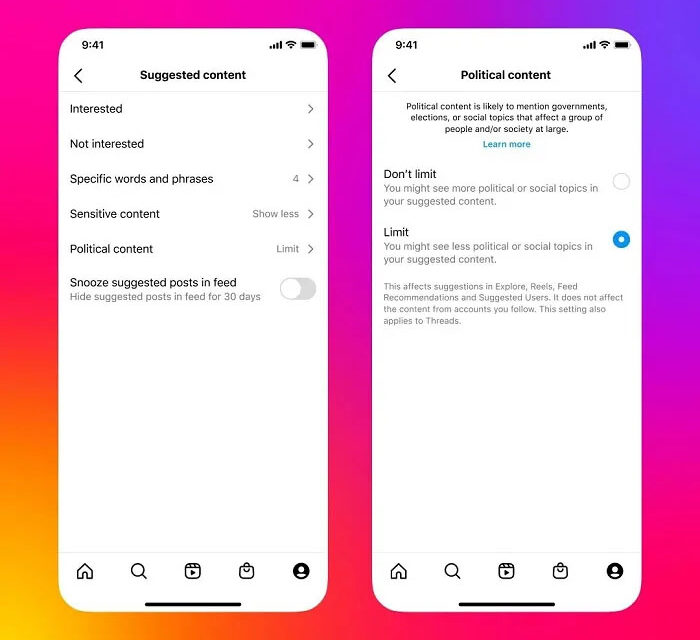By Andrew Hutchinson
Source: www.socialmediatoday.com, March 2024
The biggest social media topic of the week was the revelation that Meta is now actively restricting the reach of political content, with users required to manually opt-in to seeing politics-related posts in their main feed.
Well, that was the biggest industry topic. Princess Kate revealing that she has cancer was probably the focal point of broader discussion. And the two are actually related, in a way.
I’ll explain.
So first off, on Meta’s political news restrictions. This has actually already been happening for some time, with Meta actively stepping back from news and politics since 2021.
Why? Because for Meta, political discussion is actually more trouble than it’s worth. The company has come under intense scrutiny, and has copped various fines, due to the role that it may or may not play in political campaigning.
In 2019, Meta was fined $5 billion over the Cambridge Analytica scandal, which purportedly saw Facebook being used to influence voters based on people’s psychological leanings. Meta has also been investigated over Russian-based influence campaigns, specifically in the lead-up to the 2016 US election, while it’s also been accused of political bias in its trending topics, through its moderation choices, reach restrictions, etc.
Really, it’s a no-win situation for the company, it either lets more content through, and gets accused of undermining democracy, or it restricts more and gets accused of the same.
But even more than that, Facebook and IG users have been actively telling Meta that they don’t want to keep seeing divisive political content in their feeds.
Back in 2021, Meta CEO Mark Zuckerberg said that:
“One of the top pieces of feedback we’re hearing from our community right now is that people don’t want politics and fighting to take over their experience on our services.”
That’s what sparked Facebook’s initial exploration into reducing political content more broadly, and with news and politics only making up around 3% of what people see in either app anyway, it seemed like a viable possibility, despite the perception that it drives significant engagement.
TikTok also, inadvertently, gave Meta a new way forward on this, by displaying short-form video clips based on systematic recommendations, and not restricted by which pages and people you follow.
Users initially voiced their opposition to the change, which suddenly saw a heap of random video clips showing up in their feeds. But the stats speak for themselves: Since implementing AI based content recommendations, Facebook and Instagram usage has increased, with up to 40% of the content that users are shown in the app now coming via this system.
So, people are responding well to entertainment-based content, and politics brings more headaches. On balance, removing politics entirely makes sense.
You can, of course, still opt in to seeing politics-related posts, and you can still follow profiles that post political content, and Meta’s systems will still show it to you. But effectively, as a result of making political content opt-in, that will inevitably mean that political posts, and related profiles, around going to get less reach.
But again, the logic here is actually pretty sound, especially in the lead up to what’s expected to be a highly divisive US Presidential campaign.
Which brings us to the British Royals, and the big news of the week. The other inevitability of Meta’s change is that other salacious content is going to get more reach as a result, so you can basically expect Facebook and IG to become more like supermarket tabloids, as opposed to political polarization systems.
Why? Because research shows that content which sparks an emotional response is more likely to generate engagement. That’s why politics gets traction, because it really triggers people, and why politicians who take controversial stances have been able to get so much attention in the social media era.
But now, without these posts to fill the space, other content that gets people’s juices flowing is going to find a new audience.
Is that better? Well, Hollywood gossip is less harmful in general, so probably, yes, and if engagement in both apps keeps rising, despite the reduction of politics-related material, it seems like it could end up being a win for Meta.
There is, of course, a question around what qualifies as “political”, with Meta’s current guidelines being fairly vague around what, specifically, will be impacted as a result.
As per Meta:
“Informed by research, our definition of political content is content likely to be about topics related to government or elections; for example, posts about laws, elections, or social topics. These global issues are complex and dynamic, which means this definition will evolve as we continue to engage with the people and communities who use our platforms and external experts to refine our approach.”
The generalities here could lead to varying impacts for brands and publishers, and as noted, that will lead to other stories becoming bigger as a result.
And while many have raised concerns about Meta actively stepping back from politics, and the broader impact that could have, for Meta itself, it could end up being both a logical and beneficial shift.

